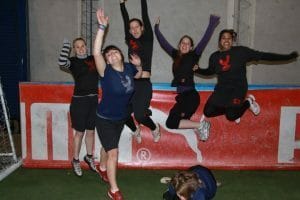- 16th July 20129th March 2022
- by megan
Pass the Baton Before You’re Ready
One thing I’ve noticed as Uni Women’s coordinator, going into my second year of the role, is that a lot of teams have the same women’s captain two years in a row. And I can definitely see the advantages: you’ve already blundered through the main mistakes of being a captain and learned from them, you’ve refined the systems you have in place for getting people to pay, getting people to training, getting people to tournaments.
But from my perspective as a non-graduater (actually I’ve graduated twice already, so ha), it’s pretty clear to me that one of the strengths of our club is that if we can absolutely avoid it, we don’t have the same captain two years in a row. Not because any of our captains in recent years have been outright terrible and you wouldn’t want them to do it again – on the contrary, we’ve had some fantastic tacticians and motivators – but because captaining is a skill, building a team is a skill, and it’s one we need to keep passing on to future generations of the team.
I’m not saying I wouldn’t love another shot at captaining – mostly to implement the lessons I learned the year I was captain. But actually, I can implement that learning by helping our new captains, and that’s going to be way more useful for the club.
Yes, this system means our new captains often have the challenge of working out how to captain their old captains, and sometimes even how to captain their coaches, and how to manage players who are often more experienced than themselves, but it keeps us getting fresh blood into the committee. Fresh blood means new ideas; it means innovation. Innovation means improvement.
Bringing in new people to the ‘inner circle’ is critical if you’re going to keep your club going after you’re gone. Sure you need some overlap: you need the old hands who know exactly what they’re doing and can register and pay for a tournament with their eyes closed, but you also need the people who are going to become those old hands in a year or two’s time. With a few exceptions, we only get players for 3 years, so you need your second year players learning as much as possible so they can pass it on in their third year. University ultimate is relentless in its turnover rate, so you have to be relentless not just in your recruiting but also in your training and knowledge transfer.
Captaining is an obvious ‘baton’ that I believe needs passed on, frequently, and it’s the one we’re good at passing on as a club. I think the more subtle things to pass on are some of the more difficult ones, like game planning, strategising, tactical knowledge and understanding.
Personally, I am a bit of a nerd in all areas of my life – I learn things better by both doing and thinking about them – and I’m also a little bit obsessed with ultimate. It means in my years of playing ultimate I have watched literally hundred of hours of game play, and spent lots of that time working out what I’m seeing tactically on the pitch. I’ve pestered more experienced players than me to talk about tactics, to explain why certain stuff works. I’ve analysed the differences between tactics for mixed, vs. women’s, vs. open, and have tried to work out what works in each and why. Really, I felt like at undergrad I ended up with a joint degree – in psychology and ultimate.
But not everyone is a nerd about ultimate. This is definitely a good thing, but it also means that for the Squaws teams I coach I need to work out a way to pass on tactical understanding and the ability to strategise without the players I’m trying to teach being as obsessed as me. Lots of people learn by doing, rather than thinking, so I need to think about getting our returning players to do tactics in games, to work out in the middle of the action what might work better. It’s going to be tough, and I love the tactical side of the game, so I’m going to have to remind myself again that it’s not about me having fun being a brain, it’s about training up some brains to replace me.
I can think of plenty of ‘batons’ that need passing on – the main handler, the key upfield receiver, the tactician, the team idiot (although I hear we’re getting Fluff back next year)… As an experienced player, sometimes it’s about going out and making game winning plays. But sometimes it’s about making space for the less experienced players to learn how to make those plays, and learn how to fill those roles – and helping them along the way. Yes, it’s your final year, and you want to dominate, but you also need to teach others to dominate, which means passing on the baton before you’re ready, so that the new recipients get a chance not only to learn how to do all this cool stuff, but also how to pass it on when it’s their turn.
Note: Sorry for the delay – been doing some real actual academic work for a few weeks, so been behind with posting. My bad. Expect more (and better!) posts in coming weeks…
 Featured
Featured


